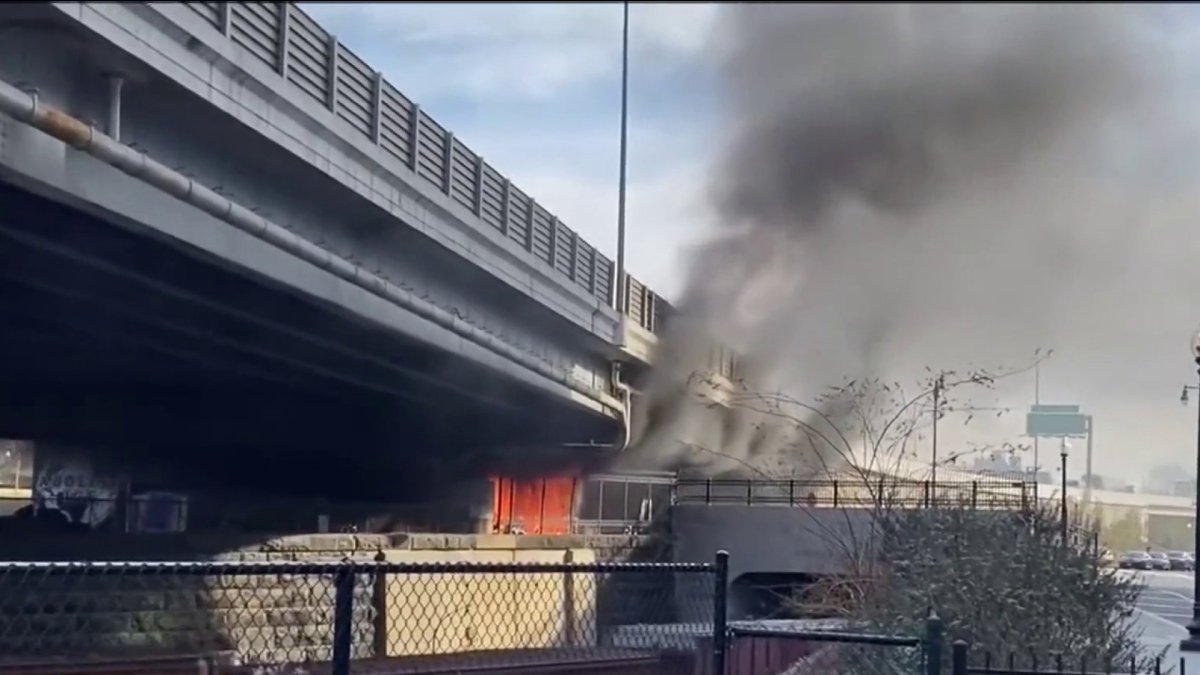
The nation’s capital is suffering a surge in the number of fires and fire department responses to encampments for people experiencing homelessness.
A News4 I-Team investigation revealed fire department calls more than doubled at encampments already this year.
The problem is posing a risk to the safety and health of people living in encampments and in nearby neighborhoods.
“I’ve seen several tents on fire, burned up,” said Kory Walker, who has been living at an encampment on O Street NW for multiple years.
We're making it easier for you to find stories that matter with our new newsletter — The 4Front. Sign up here and get news that is important for you to your inbox.
The fires are often accidentally ignited by makeshift heating equipment, including grills, space heaters and cooking equipment, said Walker. Others, he said, are deliberately set during disputes between people living in encampments.
Advisory Neighborhood Commissioner Rachelle Nigro said the encampment near New Jersey Avenue and O Street NW had several large fires in recent months.
“Five significant fires, and there are small fires set almost daily for grilling or for getting rid of mosquitoes. That type of thing,” Nigro said.
Local
Washington, D.C., Maryland and Virginia local news, events and information
Firefighters responded to a tent fire at that park in October where one man was found dead.
“The tent was on fire, and they were yelling, ‘There’s a body in there,’" Walker told the I-Team.
D.C. Fire and Emergency Medical Services records obtained by the I-Team under the Freedom of Information Act show calls for service to some of the largest known encampments rose from approximately 10 in 2020 to at least 24 this year. That included multiple fires on L and M streets in NoMa and New Jersey Avenue near O Street NW.
The increase in fire parallels an increase in the size and spread of encampments throughout the District during the COVID-19 pandemic, when the District limited removal of encampments.
D.C. Deputy Mayor for Health and Human Services Wayne Turnage recently told D.C. Council members the District has experienced a 40% increase in encampments since the pandemic, including at least 134 different sites.
“It's just been a steady increase of more and more tents, more and more people, more and more trash, more and more everything,” said Louis Rosa, who lives near one of the largest encampments on New Jersey Avenue NW.
Rosa has seen and documented a number of emergency calls at the park.
Other neighboring communities said fires have threatened nearby homes and contributed to the deteriorating health and safety condition of the encampments.
“I'm seeing fires, I'm seeing the ambulance come over there and pick people up,” said Denise Murray-Morgan, who sits on the board for the Second Northwest Cooperative Home Association and resides in an apartment overlooking an encampment.
"I don't feel safe taking a walk in the community because all of this stuff around us," she said.
D.C. Fire Chief John Donnelly acknowledged the number of fire calls to encampments has increased in the past year.
“Those tents are flammable,” he said.
Donnelly said the agency is conducting inspections of areas in which people experiencing homelessness are residing to reduce the risk of accidental fires and emergencies.
“Grills are legal,” he said. “They're not a great idea and they shouldn't be used in a tent, and we educate people about that."
The city began a new pilot program this year to fast track residents at some of the area's largest encampments into housing.
"We have allocated more than $3 million to fund this effort," Turnage said in a D.C. Council hearing.
But the program has been controversial as it also includes removing some encampments, like the one under a railroad bridge at 2nd and L streets in the NoMa neighborhood in October.
But Turnage defended the program to D.C. Council members this month, saying, "This is a housing first model, not an eviction boom."
"This trial will inform our thinking on whether this approach is an effective method for immediately housing the more than 300 residents who live in encampments on the street across the District," he went on to say.
Find out more about the Coordinated Assistance and Resources for Encampments pilot program here.
Reported by Scott MacFarlane, produced by Rick Yarborough, shot by Steve Jones and Jeff Piper, and edited by Steve Jones.